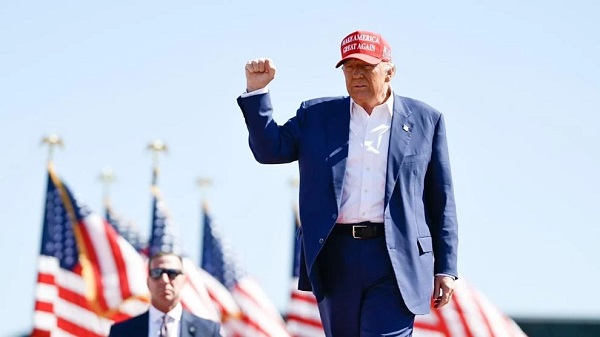From The Center Square
By
President-elect Donald Trump, who is set to take office Monday, has made a series of promises of major executive actions on “day one” in office.
One of the simplest and more controversial of those “day one” plans is to pardon some of the Jan. 6 protesters currently behind bars or facing prosecution. The president has broad power to pardon, shown most recently when President Joe Biden pardoned his own son for crimes he committed or may have committed over more than a decade span.
But Trump’s “day one” executive orders are far from limited to pardons.
On energy policy, Trump has pledged to open up domestic oil drilling in a major way in an effort to lower costs for Americans and boost the energy industry. He has also promised to end a Biden-era rule that would require more than half of Americans to transition to electric vehicles over the next decade.
Trump has also consistently tapped into America’s frustration over the border crisis and broken immigration system.
Since President Joe Biden took office, more than 12 million illegal immigrants have entered the U.S., overwhelming some cities and raising national security concerns, since some migrants are on the federal terror watch list.
Trump has also promised to end transgender participation in women’s sports, something lawmakers in the House have already passed a bill to quench.
Trump has threatened “day one” tariffs as well, though it is unclear how wide-ranging those tariffs could be, since Trump likes to wield them as a negotiating tool against other nations.
On foreign policy, a ceasefire in the war between Hamas and Israel apparently has been reached, just days before Trump took office. In the Ukraine-Russia war, Trump promised on the campaign trail to put an end to that war “in 24 hours.”
In a series of campaign speeches and media interviews, Trump has promised some “day one” actions to address the border and immigration crises.
These actions include:
• Trump has plans to reinstate Title 42, a COVID-era policy that helps shut down the southern border.
• Trump has said he would also reinstate “Remain in Mexico,” a policy that Trump used during his first term that requires asylum seekers to wait in Mexico for their claim to be processed. Biden ended that policy and let migrants in and asked questions later.
• According to Politico, Trump is considering designating cartels south of the border as terrorist organizations, a policy once pushed by Florida Gov. Ron DeSantis when he was running for president that could open up a flood of new resources and executive powers at the border. Texas Gov. Greg Abbott designated the violent Venezuelan prison gang, Tren de Aragua, a foreign terrorist organization last year.
• Trump has threatened to end birthright citizenship for the children of illegal immigrants born in the U.S., but it remains unclear if he has the Constitutional authority to do so since birthright citizenship is enshrined in the 14th Amendment.
• Trump has made overtly clear that he plans to kickstart a massive, never-before-seen deportation program for the millions of illegal immigrants in the U.S. Trump’s appointee as border czar, Tom Homan, has been clear saying publicly that Trump named this as a top priority when choosing him for the job.
“On day one, we will SHUT DOWN THE BORDER and start deporting millions of Biden’s Illegal Criminals,” Trump said over the summer during the campaign. “We will once again put AMERICANS First and MAKE AMERICA SAFE AGAIN!”















